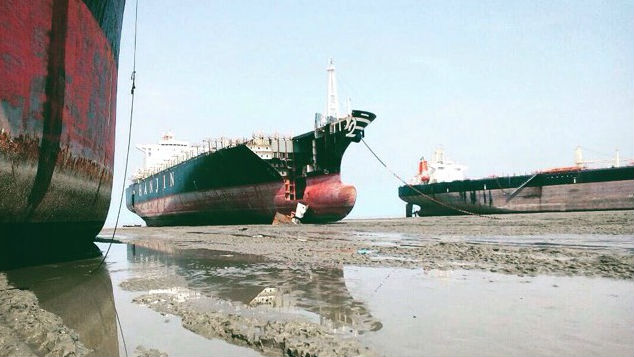 |
| Credit: NGO Shipbreaking Platform - Hanjin
Rome beached in Chittagong, Bangladesh |
The NGO Shipbreaking
Platform reports that two workers lost their lives at Chittagong shipbreaking
yards in May, bringing the total death toll this year to six workers.
On 6 May, 26-year-old
Shahinoor died at Jamuna Shipbreaking yard after falling whilst working on the
Hanjin Rome, the first vessel arrested after the collapse of Hanjin Shipping
last year. The vessel was put up for auction by the High Court in Singapore early
this year, and the Platform said the vessel was sold to a cash buyer for
recycling.
This is not the first time
that courts, in deciding on bankruptcy cases, completely ignore the
environmental and human repercussions of selling shipping assets to beaches,
with the sole purpose of sorting out failed companies’ balance books, says
Ingvild Jenssen, Founding Director of the NGO Shipbreaking Platform.
Jenssen says deaths on the
beaches have also been a direct consequence from bankruptcy cases in Germany,
such as the sale of the King Justus to Alang and the Viktoria Wulff to
Chittagong.
“That insolvency
administrators appointed by the courts in Singapore and Germany have been
allowed to trade unprofitable ships to the beaches of South Asia is shocking,”
she says.
On 9 May, winch operator
Ishaq was hit by a wire cable and died on the spot at KR Steel. According to
local sources, KR Steel was dismantling the vessels Sea Zenith and Kota Wisata
when Ishaq was killed.
Earlier this year the
Institute for Global Labor and Human Rights (IGLHR) published a detailed
account of the fatal accidents that killed 19 workers in Chittagong in 2016.
The report includes interviews with workers that describe harsh conditions,
lack of protective equipment, exposure to toxic gases and fumes and a constant
fear of dying at work:
“There are enclosed dark
places on the ship, where there is no ventilation. The cutters go in first [to
cut holes in the sides to let light in]. Especially they get sick and
nauseous,” a worker reports to IGLHR.
“All of us cutters get sick
from the chemicals. It always happens,” other workers add. “I work at night
because the owner wanted me to work the night shift,” says a worker, adding,
“it is cooler. You sweat less. So for me, it is better. But it is more
dangerous. That is the biggest worry: It is very risky. At any time, I could
lose my life”.
Chittagong-based Platform
member Young Power in Social Action (YPSA) recently organized a human chain and
a rally gathering more than 100 workers and their family members.
“Six workers have died this
year. Many more workers have suffered serious injuries. Safety and workers’
rights are shamefully being ignored in most yards,” said Muhammed Ali Shahin
from YPSA. “Whereas the Bangladesh Shipbreakers’ Association is reluctant to
take any action on the yards where workers are dying, the Courts should act
immediately to ensure that no yard is allowed to operate in breach of national
laws on occupational safety and environmental protection.”
Source: maritime executive. 18 May 2017
No comments:
Post a Comment